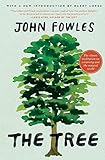 Thirty years ago, the late British author John Fowles, who spun such imaginative tales as The Magus, The French Lieutenant’s Woman and The Collector, wrote The Tree, recently reissued by Ecco to commemorate its anniversary, a thoughtful essay on the natural world and man’s relationship with it. In its ninety pages, Fowles takes the reader on a journey through the wild and untamed. He takes to task the Victorian obsession with categorizing and trying to tame the wild, and makes a case for experiencing nature and “green chaos.”
Thirty years ago, the late British author John Fowles, who spun such imaginative tales as The Magus, The French Lieutenant’s Woman and The Collector, wrote The Tree, recently reissued by Ecco to commemorate its anniversary, a thoughtful essay on the natural world and man’s relationship with it. In its ninety pages, Fowles takes the reader on a journey through the wild and untamed. He takes to task the Victorian obsession with categorizing and trying to tame the wild, and makes a case for experiencing nature and “green chaos.”
He also trains his eye back on himself as a novelist and creator. He lauds the 18th century attitude viewing nature as a mirror for philosophers and poets, evoking emotion. Art and nature, Fowles asserts, are two branches of the one tree.
The first chunk of The Tree doubles as a fascinating family memoir, with Fowles taking us back to his boyhood before and during the Second World War. In particular, he writes of his relationship with his father, who, in his tiny suburban London back yard, created an orchard. Fowles writes of the gulf that lay between father and son, with the young man rebelling against the precisely pruned suburban tree garden and beginning a lifelong love of the woods, of the forest. Trees, countlessly plural and wild.








